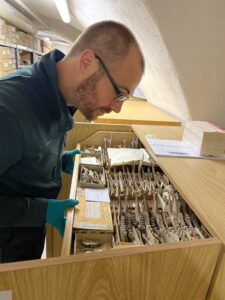 Background
Background
Geoff Smith is a zooarchaeologist interested in human subsistence behaviour and changes in human diet. His PhD at the Institute of Archaeology, University College London (UK) in 2010 focussed on key Lower and Middle Palaeolithic sites from the UK (e.g. Boxgrove, Lynford). He undertook postdoctoral research at major research centres including Monrepos Archaeological Research Centre (Germany, 2012-2015), University of California, Davis (2016-2017) and the Max Planck Institute for Evolutionary Anthropology, Leipzig (Germany, 2017-2022). His work included subsistence and diet in Middle Pleistocene Africa, Neanderthal adaptation during interglacials and mammoth hunting across Middle Palaeolithic Europe.
His most recent research has focused on investigating the differences in subsistence, diet and site use in late Neanderthal and early Homo sapiens. This has involved identifying new earlier migration of Homo sapiens into Europe prior to 45,000 years ago at Bacho Kiro Cave (Bulgaria) and Ranis (Germany). Through analysis of animal remains from these sites he has been able to document, for the first time, the subsistence, diet and site use of these early Homo sapiens groups. He is a leader in the methodological integration of biomolecular and archaeological approaches and maximising the potential of archaeological bone remains.
Between 2022-2024 he was a Marie Skłodowska-Curie postdoctoral fellow at the School of Anthropology and Conservation, University of Kent. His project BACBONE combined taxonomic identifications of bone fragments through ZooMS, with the microscopic study of alterations to bone inner structures (histotaphonomy) through micro-CT scanning, hard tissue histology and DNA analysis.
He is a Senior Researcher in Zooarchaeology at University of Reading and is lead collaborator on the ERC/UKRI COEXIST project.. He is leading work packages seeking to integrate and quantify ZooMS and zooarchaeological datasets.
